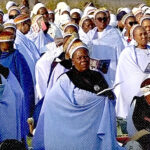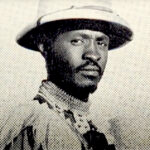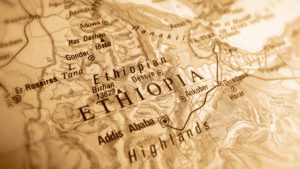African Theology has emerged as one of the most vibrant theological movements in the 20th century; and it continues to gain momentum in the 21st. African scholars have sought to articulate a faith in Christ that speaks to African realities, cultures, and worldviews. From themes of liberation, community, and spirituality, to questions of land and ecology, African Theology insists that the gospel is not foreign to Africa but can be expressed through African categories of thought.
Among the pioneers of this field, John Mbiti stands as a towering figure. His work, African Religions and Philosophy, and later writings established him as the “father of African Theology.” Mbiti argued that Africans are “notoriously religious” and that theology in Africa must speak to the deeply spiritual worldview of African peoples.
Mbiti sought to connect the role of ancestors with Christ.
Although Mbiti himself stopped short of naming Christ an ancestor, his seminal work on African traditional religion articulated categories of mediation, kinship, and the “living-dead” that provided fertile ground for later theologians to develop an explicit ancestor Christology. Mbiti’s observation that Africans approach God through intermediaries resonated strongly with the biblical portrayal of Christ as mediator, enabling a conceptual bridge between African ancestor categories and Christology.
Ancestor Christology in African Theology
In African traditional religions, ancestors are the “living-dead,” still present within the community, acting as mediators between God and the living. They are remembered, venerated, and considered guardians of morality and continuity. Mbiti sought to connect this role with Christ.
Jesus lived a full human life, died, and entered the spiritual realm.
Jesus, like the ancestors, lived a full human life, died, and entered the spiritual realm. But, unlike the ancestors, Jesus is the sinless mediator who reconciles humanity to God. Mbiti believed that using African analogies could help Africans see Christianity not as a foreign import, but rather as good news that fulfils African spiritual longings.
Other African scholars developed this idea. Ghanaian theologian J. S. Pobee described Christ as the “Great Nana,” superior to all other ancestors because he is closest to God. Tanzanian Catholic theologian Charles Nyamiti described Christ as our “Brother-Ancestor,” sharing in both our humanity and divinity. For both, framing Christ as an ancestor made the gospel culturally intelligible and spiritually resonant for African believers.
The Appeal of Ancestor Christology
At its best, this model affirmed that Christianity is not a foreign faith. Christ is not a stranger to Africa; he is present within African categories, fulfilling African longings for nearness, mediation, and community. Ancestor Christology resonates with many African Christians in meaningful ways.
It Makes Christ Relatable
Many African converts have struggled with Christianity being presented as a Western religion. By speaking of Christ as an ancestor, Mbiti showed that the gospel could be expressed in African idioms.
It Affirms Christ’s Humanity
Ancestors are remembered precisely because they were real people who lived among us. Presenting Christ in similar terms emphasises his incarnation, his identification with human struggles, and his solidarity with his people.
It Highlights Christ’s Continuing Presence
Just as ancestors are thought to remain near their families, Christ is not a distant figure of history but alive and active among his people.
Human categories always reduce God to something less than he is.
In these ways, among many others, African Theology’s proposal provided categories that helped African believers see Christianity as less foreign, even if the analogy ultimately falls short. And this is true of all analogies about God: whether it is the water–ice–steam model for the Trinity (useful for showing three forms but failing because it collapses into modalism); the shamrock with three leaves (useful for showing three-in-one but failing because each leaf is only a part, not the whole); or Christ as ancestor, analogies can shed light but never capture the infinite. They fail because the finite cannot contain the infinite, and human categories always reduce God to something less than he is.
As Isaiah asks, “To whom then will you liken God, or what likeness compare with him?” (Isaiah 40:18). Only God’s self-disclosure in scripture gives us words that reveal him truly without distortion.
Where the Analogy Falls Short
The Christ as Ancestor theological model, though innovative and contextual within African culture, needs to be evaluated in light of biblical theology, particularly Philippians 2:5-11. For while an ancestor Christology model provides African believers with a sense of cultural continuity, affirmation of Christ’s full humanity, and a mediating presence, Philippians presents dimensions of Christ’s identity that go far beyond any ancestral resemblance.
When we compare the ancestor Christology model with Philippians 2:5–11, several important differences emerge.
The Son’s Pre-Existence in the Form of God (Philippians 2:6)
Unlike ancestors, who begin and end within human history, Jesus exists eternally, fully divine, before taking on human form.
Incarnation (Philippians 2:7)
African theologians rightly long to see Jesus identified with our people, yet in the incarnation, He already is “God with us.” His birth shows both solidarity (born of a woman) and uniqueness, free from Adam’s corruption and able to do for us what no one else can do.
Obedience to the Point of Death (Philippians 2:8)
While ancestors may be remembered for exemplary lives, Jesus’ obedience and sacrificial death were unprecedented, leading God the Father to exalt him.
Resurrection (Philippians 2:8)
Ancestors remain in the grave, remembered by descendants; Jesus rose, defeating death itself. This removes Jesus completely from the category of ancestors. But also sets him apart as one who is able to save us from death.
Ascension (Philippians 2:9)
Unlike ancestors who remain confined to the grave, Jesus ascended and now intercedes before the Father, bridging the gap between humanity and God. We can trust him to mediate because he sits at the right hand of the Father.
Exaltation Above Every Name (Philippians 2:9–11)
Every knee will bow, and every tongue confess Jesus as Lord, echoing Isaiah 45:23. No ancestor, however revered, can claim such authority. In this Christological doxology, Jesus is not merely a spiritual guide; he is the object of divine worship, far surpassing the ancestral role, which is always subordinate to God.
Christ cannot simply be slotted into the ancestor category. He transcends it.
Unlike ancestors who become exalted after death, Jesus is eternally divine and chose to descend, die, and rise again. His exaltation is cosmic and universal, not local or tribal. The universal worship due to Yahweh alone is now given to Jesus (Isaiah 45:23). This means Christ cannot simply be slotted into the ancestor category. He transcends it. He is not one mediator among others but the only mediator (1 Timothy 2:5).
Lessons for African Theology
The impulse to make Jesus near to us is noble. Contextualisation is necessary. But scripture itself is often a polemic against reducing God to human categories. The Bible constantly confronts our tendency to make God like us (Psalm 50:21; Isaiah 40:18).
The Bible constantly confronts our tendency to make God like us.
African culture already knows that God is holy, transcendent, and unapproachable; and that a mediator is needed. But if that mediator is merely human—an ancestor—then he falls short just as we do. No ancestor can bridge the gap to a holy God, because all are marked by sin and death. This is precisely what makes Christ unique. His incarnation already identifies him with us; he is truly human, born of a woman. His suffering already identifies him with us; he entered our pain and weakness. But his uniqueness lies in being also truly God. Unlike the ancestors, he is sinless, free from Adam’s corruption. Unlike the ancestors, his vicarious death accomplishes salvation, doing for us what no one else could ever do.
The danger of reducing Christ to the category of ancestor is that we end up driving God further away. Instead of drawing near through the true mediator, we substitute him with a human analogy that cannot carry the weight of divine holiness. Christ is not merely “like” our ancestors; he is infinitely greater. He is the one mediator between God and humanity (1 Timothy 2:5), the risen and exalted Lord before whom every knee will bow (Philippians 2:11).
Therefore, African theology must move beyond trying to fit Christ into cultural categories and instead let Christ redefine culture. Contextualisation must serve the gospel, not constrain it. The nearness we long for is already secured in Emmanuel, God with us, whose humanity brings him close, and whose divinity brings us to God.












